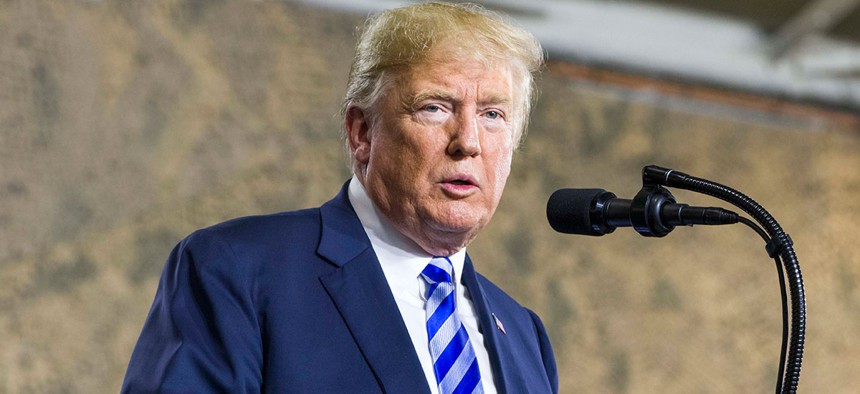
Sgt. Thomas Scaggs/ Army
Trump Wanted Out of Syria. It’s Finally Happening.
The announcement is in stark contrast to recent remarks by senior U.S. officials on the presence of troops.
President Donald Trump is finally getting his way in Syria. Vehemently opposed to the extended presence of American troops in the war-ravaged country, he had been forced to keep them there longer than he wanted. Not, it seems, anymore.
“We have defeated ISIS in Syria, my only reason for being there during the Trump Presidency,” Trump said Wednesday on Twitter.
The tweet appeared to confirm news reports that the United States would withdraw the roughly 2,000 American troops stationed in Syria who are fighting the Islamic State group. The U.S.-led anti-ISIS coalition has made significant territorial gains against the militant group, but has struggled to completely eliminate ISIS from a few pockets in Syria.
But if it is carried out, a U.S. pullout leaves open a question of the militants’ resurgence, and would delight at least two of Syria’s neighbors: Iran and Turkey. American soldiers might have been in Syria to fight ISIS, but they also served as a deterrent to the Islamic Republic, which supports Syrian President Bashar al-Assad with troops and militia fighters.
White House Press Secretary Sarah Sanders said, “We have started returning United States troops home as we transition to the next phase of this campaign.”
The announcement was in stark contrast to senior U.S. officials’ recent remarks on the presence of troops.
As recently as last week, the U.S. had other plans. Brett McGurk, the special envoy for anti-ISIS operations, was asked how long American forces would stay in Syria. “If we’ve learned one thing over the years, enduring defeat of a group like this means you can’t just defeat their physical space and then leave,” he said.
The American military operates in eastern Syria with the People’s Protection Unit, or YPG, a Kurdish militia group. Turkey says the YPG has links to the Kurdistan Workers Party, a Kurdish separatist group that operates in Turkey and is outlawed by the U.S. as a terrorist organization. Last week, Turkish President Recep Tayyip Erdogan said his troops would “start our operation in a few days” against the Kurdish group in Syria. The U.S. has a smaller presence in southern Syria.
The American withdrawal also bolsters Assad and his Iranian backers.
When the Syrian conflict began in 2011, for a while he was expected to meet the same fate as other leaders ousted in the Arab Spring. Backed by Moscow and Tehran, he remains secure more than seven years later. What’s more, the U.S. is no longer insisting on a Syria without Assad.
James Jeffrey, the American special representative in Syria, said Monday the U.S. would fund Syria’s reconstruction only if the regime is “fundamentally different.” But he immediately added, “It’s not regime change. We’re not trying to get rid of Assad.” He acknowledged that while the U.S. wants Iranian troops to leave Syria, Tehran would continue to exert influence with Damascus.
Jeffrey’s remarks at the Atlantic Council followed two regional developments that signal the beginning of Assad’s rehabilitation: On Sunday, Sudanese President Omar al-Bashir became the first member of the Arab League to visit Syria since the civil war began in 2011. Bashir, an international pariah because of his role in the Darfur conflict, is unlikely to have met with Assad without regional blessing. Subsequent news reports said Assad would likely be invited to the next Arab League summit meeting, a boost for the dictator, who was expelled from the organization over the conflict.
Perhaps more significant, Turkey, which armed and funded rebels fighting Assad, said it would consider working with the Syrian president if he won a democratic election. Jeffrey implied Monday that the standard wouldn’t even have to be that high: Assad, he said, mustn’t use chemical weapons or torture Syrian citizens.
“It doesn’t have to be a regime that we Americans would embrace as, say, qualifying to join the European Union if the European Union would take Middle Eastern countries,” he said.
As recently as October, the Trump administration’s stated goal in Syria was for Syrians to “establish a new government that is not led by Assad.” But there is now recognition that the conflict is no longer restricted to the regime fighting the rebels—or indeed the U.S. clashing with ISIS.
Russia has invested heavily in Assad and is unlikely to succumb to outside pressure that could weaken its interests. Iran, whose regional actions are the focus of the Trump administration’s Middle East policy, is a different case. Jeffrey said Iranian troops must leave Syria, even while acknowledging Tehran’s role. “Iran will have diplomatic influence in Syria,” he said. “It’s had it for many decades. It will have more now.” With a U.S. withdrawal, that influence will now almost certainly increase.






